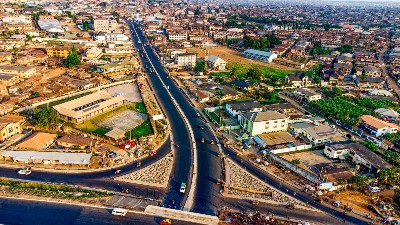
By Sulaimon Olanrewaju
The recent commissioning of eight feeder roads, totaling 38.48 kilometers, within the Ibadan Zone highlights Governor Seyi Makinde’s steadfast commitment to addressing the road infrastructure deficit in Oyo State.
During the commissioning, Governor Makinde remarked, “As a government, our job is to do our best with the limited resources we have to keep residents happy and attract more people to our state. This is how we grow our economy. We acknowledge that we do not have all the resources at our disposal, so we cannot meet all our needs simultaneously.”
He added, “This commissioning today is just the beginning. Our administration earmarked an initial 95.58 kilometers of feeder roads for asphaltic improvement and reconstruction in December 2023. With over 38 kilometers completed and the remaining 57 kilometers ongoing, I can confidently say we are more than halfway done.”
Since assuming office in May 2019, the Makinde administration has made remarkable strides in improving road infrastructure across Oyo State. Between June 2019 and May 2023, the government completed 144.37 kilometers of roads. From June 2023 to May 2024, an additional 152.92 kilometers were completed.
With the recent completion of 38.48 kilometers of feeder roads, the total now stands at 335.77 kilometers of roads completed, with another 273.31 kilometers currently under construction. These achievements do not include numerous road projects undertaken by local government councils throughout the state.
This progress is particularly noteworthy as road infrastructure has become a trending topic on social media, especially on platforms like X (formerly Twitter).
While the focus has been on road conditions in other South-West states, Oyo State’s efforts to address its infrastructure deficit have also come under scrutiny.
Previous administrations primarily focused on road rehabilitation within the Ibadan Zone, leaving inter-zone commuting difficult and time-consuming due to the poor state of intra-state roads. This not only hindered economic growth outside Ibadan but also placed a heavy reliance on the zone for internally generated revenue.
Recognizing the need for a new approach, Governor Makinde adopted a strategic plan to allocate resources towards roads critical to the state’s economy, aiming to accelerate development and economic growth. The goal was to connect all zones with motorable roads, opening up other parts of the state to more investments.
Given that Oyo State is largely agrarian, improved rural roads were also necessary to facilitate market access for farmers.
In July 2019, just six weeks into office, the Makinde administration paid counterpart funding for the World Bank-assisted Rural Access and Agricultural Marketing Project (RAAMP) to rehabilitate 1,000 kilometers of rural roads. Once the matching funds are released, the project will commence.
One of the administration’s first major projects was the 65-kilometer Moniya-Iseyin Road, a federal road connecting the Ibadan Zone, the main consumption center, with the Oke-Ogun Zone, the state’s food basket.
Despite the challenges posed by the COVID-19 pandemic, the project was completed in 18 months, leveraging Oyo State’s comparative advantage in agriculture.
Subsequent efforts included connecting the Oke-Ogun and Oyo Zones by reconstructing the 34.85-kilometer Oyo-Iseyin Road, linking the Ibarapa and Oke-Ogun Zones through limited rehabilitation of the 38-kilometer Igboora-Igangan-Iganna Road, and connecting the Oke-Ogun and Ogbomoso Zones with a new 76.67-kilometer road between Iseyin and Ogbomoso. The ongoing rehabilitation of the 48-kilometer Ido-Eruwa Road will further enhance connectivity between the Ibadan and Ibarapa Zones.
Beyond major inter-zone roads, the Makinde administration has undertaken various road projects across the state, including the completion of ongoing and abandoned projects inherited from previous administrations.
Notable examples include the 12.5-kilometer Challenge-Apata Road, the 9.7-kilometer Saki Township dualization, and the 5.2-kilometer Gedu-Oroki-Sabo-Asipa Road.
Local government councils have also played a crucial role in road rehabilitation. Projects like the 10.3-kilometer Ido-Omi Adio Road by the Ido Local Government Council, the 14.1-kilometer Eruwa-Lanlate-Maya Road by the Ibarapa East Local Government Council, and the 6-kilometer Idiko-Ile Ayegun Road by the Iwajowa Local Government Council have significantly improved access and connectivity within the state.
With four out of the five zones now connected, the focus has shifted to feeder roads.
In 2024 alone, the government awarded contracts for the reconstruction and rehabilitation of 106.41 kilometers of roads in Ibadan, with eight feeder roads totaling 38.48 kilometers already completed.
Governor Makinde has assured that similar efforts will be extended to the remaining four zones.
This strategic approach to bridging the infrastructure gap is yielding positive results. Improved connectivity has attracted more businesses to set up operations outside Ibadan, significantly reducing journey times and fostering economic growth.
For instance, the Fasola Agribusiness Industrial Hub, situated along the reconstructed 34.85-kilometer Oyo-Iseyin Road, is now fully occupied by medium to large-scale businesses.
Increased investments have boosted Oyo State’s internally generated revenue from an average of N1.8 billion monthly in 2019 to N4.9 billion monthly as of Q1 2024. This revenue growth enables the state to allocate more resources to road projects, ensuring continued progress in addressing the infrastructural deficit.
Oyo State is now emerging as a new hub for real estate development and other major projects in Nigeria. It is rare to find a development project in the country that does not feature Oyo State, a direct result of Governor Seyi Makinde’s strategic approach to road construction.
As promised by Governor Makinde, the government has no intention of slowing down. The ambitious 110-kilometer Circular Road, which encircles Ibadan and aims to reduce congestion and provide an alternative route for motorists passing through Ibadan to other states, is currently under construction. The road will be tolled to generate revenue, and Makinde has promised that at least 70 kilometers of the project will be completed before the end of his second term.
Indeed, the Seyi Makinde administration is guided by the mantra, “Where roads go, development follows,” as it works to lift the people of Oyo State from poverty to prosperity.
